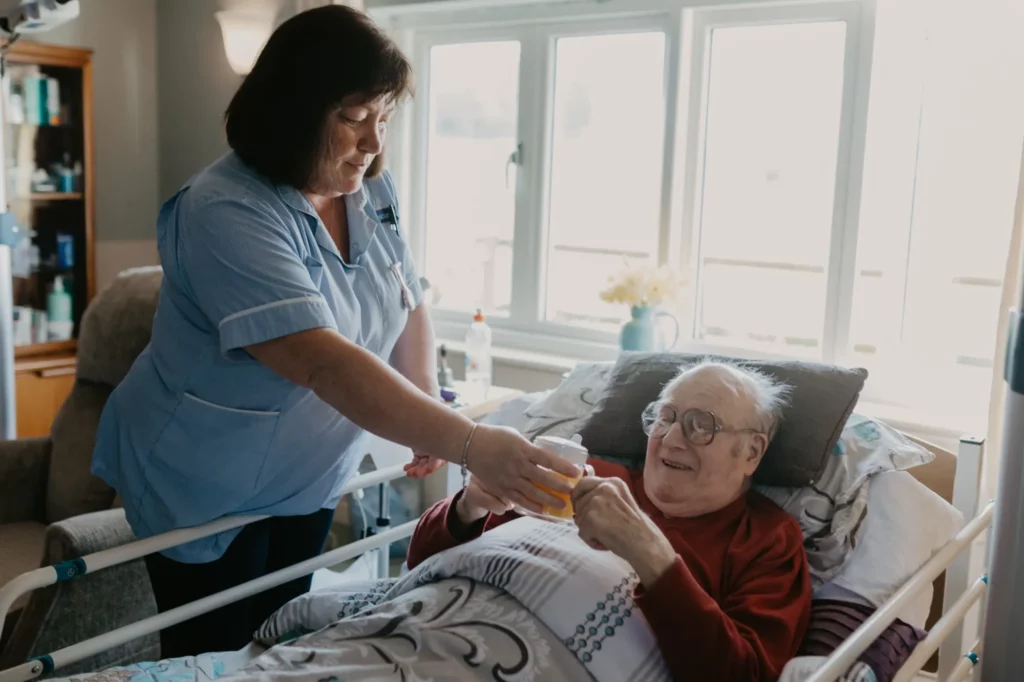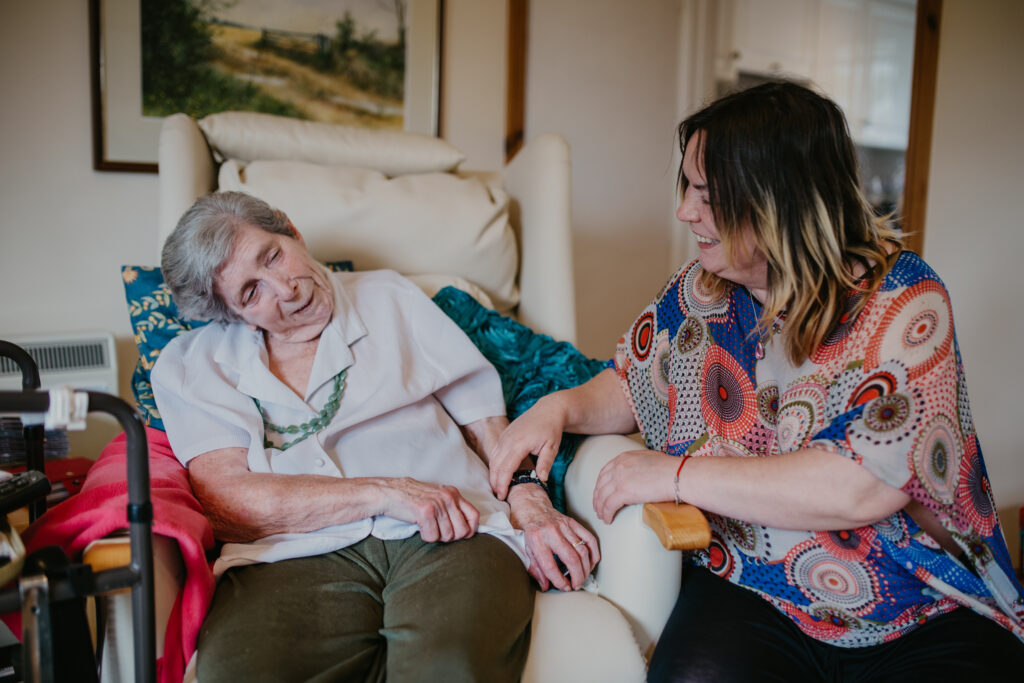Epilepsy is a neurological condition that affects the brain and causes recurrent seizures. It is not an illness or a sign of weakness. It simply means that a person’s brain activity can sometimes become disrupted, leading to different types of seizures. Every person with epilepsy experiences it differently, with varying triggers, patterns, and effects on daily life.
We understand that living with epilepsy, or supporting a loved one with the condition, can bring both challenges and adjustments. Through our specialist epilepsy care and support services, we provide personalised assistance that focuses on promoting safety, independence, confidence, and well-being.
Our experienced care professionals offer flexible support through live-in care, home care, and our care and nursing homes. We adapt our approach to each person’s individual needs, triggers, and routines to provide reassurance, comfort, and consistency.
If your needs change or become more complex, we are fully equipped to adjust the level and type of support to suit your circumstances, ensuring that you or your loved one continues to live safely, confidently, and with dignity and respect.

What is Epilepsy care?
Epilepsy care provides personalised support for people who experience recurrent seizures, helping them to live safely, confidently, and independently. Because every person’s experience with epilepsy is different, the level and type of support provided is tailored to each individual’s needs, preferences, and medical requirements.
Our epilepsy care services are designed to promote safety, independence, and quality of life. Depending on your needs, care may include 24-hour live-in support for ongoing assistance, regular home care visits for daily support, or tailored care within one of our care and nursing homes.
From seizure management and medication support to personal care, emotional reassurance, and companionship, we adapt our approach to ensure comfort, dignity, and consistency at every stage of life.

Our Epilepsy support services
Our epilepsy support services are designed to provide the best care for people living with epilepsy, built entirely around each person’s unique needs, preferences, and goals. We create personalised care plans that focus on safety, independence, and quality of life, ensuring you or your loved one receives the right level of support at every stage of life.





Specialist Epilepsy care
Our specialist epilepsy care supports people with a wide range of needs, including those with frequent or complex seizures, co-occurring neurological conditions, learning disabilities, or additional health challenges. Every care plan is tailored to the individual’s medical, safety, and emotional needs to ensure the best outcomes, independence, and quality of life.
Local Authority and NHS Partnerships
Agincare works closely with local authorities and the NHS to help people access the right level of support for epilepsy and related needs. We partner with over 60 local authorities and NHS trusts across England, providing fully managed, tailored care packages. These partnerships ensure continuity of care, allowing individuals to access expert support in the community and benefit from a structured, safe environment with the right interventions and ongoing assistance.
Nursing Care
We provide expert nursing care as part of our specialist epilepsy services, supporting clients with complex medical, personal, and safety needs. Our team delivers personalised care including health monitoring, medication management, support with daily living, and assistance with seizure management or other neurological challenges, helping clients to live safely, comfortably, and as independently as possible.

Meet Cher – Our Clinical Lead
Cher has enjoyed a long and varied career in health and social care across Europe and the UK. A registered nurse, she set up her own domiciliary care service in Monaco, later expanding it into France, supporting people with complex care needs. Before joining Agincare in April 2023, Cher worked for the DWP in disability analysis and as a Mental Function Champion. Cher oversees the clinical aspects of our live-in care service, including quality assurance, technical competency, and training.

Case Study: Emily’s Story
Personalised support can make a real difference for people living with Epilepsy. Watch this video to see how Emily’s care has helped her and her family gain independence, confidence, and quality of life.

Registered Nurse Care and Nursing Associates
Our specialist epilepsy care services are supported by highly trained registered nurses and nursing associates, providing expert care for individuals with complex needs.
Registered Nurses deliver personalised clinical care, including support with pain management, symptom control, medication administration, and coordination with other healthcare professionals. They ensure that each person’s medical and well-being needs are met safely and effectively, supporting comfort, dignity, and quality of life.
Nursing associates work alongside registered nurses to provide day-to-day support, help with personal care and daily living activities, and assist in implementing personalised care plans. Their role bridges clinical care and hands-on support, helping individuals maintain dignity, comfort, and consistency in their care.
Together, our nursing teams provide a seamless approach to epilepsy care, ensuring that both medical and personal needs are met with professionalism, compassion, and expertise.


Costs of Epilepsy care
The cost of epilepsy care varies depending on the type of service, level of support, and complexity of individual needs. Understanding epilepsy support costs can help you plan and choose the right care for yourself or your loved one.
Our live‑in care for epilepsy starts from £1,135 per week, with transparent pricing and tailored quotes based on individual needs. Our experienced care advisors can guide you on paying for epilepsy care and help you explore funding options to ensure the right support is in place.
Already receiving epilepsy care and support? You could be paying more than you need to. Find out quickly with our Cost Savings Calculator, a simple tool that helps you compare your current care costs and see how much you could save with Agincare.

CQC information
When you are looking for information, be sure to visit the Care Quality Commission’s website. The CQC monitors and inspects care services and publish what they find to help you find the best care.
Funding
At Agincare, we work closely with individuals, local authorities, case managers and solicitors to ensure you receive the right funding and support for your needs. Our experienced team can guide you through available options, including local authority funding, NHS continuing healthcare and privately funded care, helping you make informed decisions with confidence and transparency.
Why choose Agincare’s Epilepsy services?
Our epilepsy services are trusted by thousands of families, local authorities across the country, and the NHS to deliver reliable, high-quality care. Our bespoke, fully-managed service is regulated by the CQC and rated ‘Good’.

One of the largest independent care providers in England, with decades of specialist care experience

Family-owned care provider established in 1986

Rated excellent on Trustpilot

Fully managed care provider

24/7 updates on your package of care via our app

Fully trained live-in care workers directly employed by us

Immediate and emergency starts available

Tailored support for varying levels of need, including specialist nurse-led care for complex conditions

Dedicated care supervisor to oversee your care

No lengthy contracts or exit fees – flexible, transparent support

Offer a range of services including live-in care, home care and care homes

All of our care workers are English-speaking and enhanced DBS checked
Reviews of our services




How to arrange care
Getting started with epilepsy care is simple and obligation‑free. Our step‑by‑step process makes arranging support straightforward and stress‑free:
Our expert team is here to guide you through every step with compassion and clarity, and there is no obligation to proceed.

Frequently asked questions
Epilepsy is a common condition that affects the brain and causes frequent seizures.
Seizures are bursts of electrical activity in the brain that temporarily affect how it works. They can cause a wide range of symptoms.
It’s often lifelong, but can sometimes get slowly better over time.
Seizures can affect people in different ways, depending on which part of the brain is involved.
Possible symptoms include:
Uncontrollable jerking and shaking, called a “fit”
Losing awareness and staring blankly into space
Becoming stiff
Strange sensations, such as a “rising” feeling in the tummy, unusual smells or tastes, and a tingling feeling in your arms or legs
Collapsing
Sometimes you might pass out and not remember what happened.
All our care and support staff complete the nationally recognised care certificate. Specific training is taught by our training partner Training Now and healthcare professionals.
The specialist may suggest having a test to check your brain activity called an electroencephalogram (EEG), or a brain scan to look for any problem in your brain.
But if these tests do not show anything, it’s still possible you have epilepsy, and you may be diagnosed just based on your symptoms
Though epilepsy is often a lifelong condition, most people with the condition are able to lead normal lives if their seizures are well controlled and monitored.
Through the right treatment, preparation and support you will be able to take more control of your seizures.


